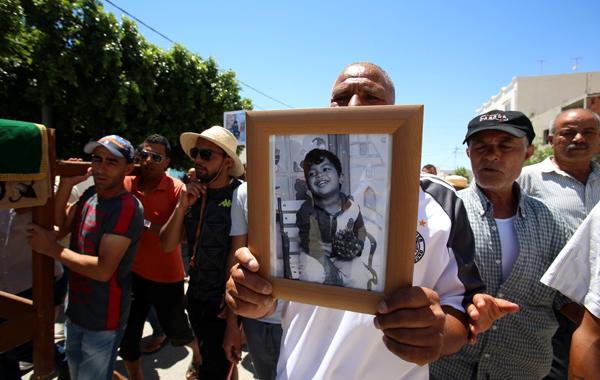You are here
Tunisia turns to tough economic agenda
By Reuters - Feb 12,2015 - Last updated at Feb 12,2015
TUNIS — Just two days after confidently promising economic reforms to match Tunisia's transition to democracy, new Prime Minister Habib Essid was forced to say he would roll back a new tax after police shot dead a man protesting it.
Tunisia has been praised as an example of compromise politics and democratic transition since overthrowing its autocrat Zine El Abidine Ben Ali in a 2011 uprising, holding free elections and drafting a new constitution.
But the latest protests have made clear Essid's economic task list that includes reforms, development and boosting jobs will not be easy in a country reliant on tourism, with few natural resources, high unemployment and heavy state subsidies even with the goodwill of the coalition government.
"What do they mean by reforms, obeying the international Monetray Fund. That just means more misery for us, more sacrifices on our part," said Sami Majdoub, 30, an unemployed graduate. "Their priority should be creating jobs, not increasing prices."
Since its revolution, lenders such as the International Monetary Fund (IMF) have tied credits for Tunisia to efforts to curb heavy public spending and cut a budget deficit by reforming subsidies ranging from basic food goods to fuel.
Authorities tried to raise money by imposing a tax of $20 on foreign travellers, but this angered residents of Dhiba and Ben Guerdan, two remote towns on the Libyan border. They asked for it to be frozen because it hurt daily trade with Libya, which responded by imposing a tax on Tunisian travellers.
Tunisian traders protested, and youths demanding jobs joined them, torching a local police station. Police opened fire with bullets and tear gas, killing one man, witnesses say.
"We will not be silent, we will rebel if any one touches our interests and our work, whatever the political colour of the rulers, whether Islamist or secular, old system or a new system," said Mohammed Amari, a trader in Dhiba.
Protests over economic opportunities are still sensitive in Tunisia, where a street vendor set himself on fire in 2011 in protest over poverty and local official abuses, and helped trigger the "Arab Spring" revolts across the region.
Last week was not the first Tunisian backtrack. A year ago, the government was forced to reverse a vehicle tax and energy price hikes after a string of protests.
Creating jobs is also urgent with unemployment creeping to 15.2 per cent in 2014 from 12 per cent a year after the uprising that promised more freedoms and economic opportunities. A third of those jobless are young graduates.
Tackling youth exclusion is especially sensitive as Tunisia fights a campaign against Islamist militants who emerged after the revolution. Around 3,000 young Tunisians have already left to fight with extremist groups in Syria and Iraq.
Majority in congress
Tunisia has managed to avoid the upheaval afflicting other Arab Spring nations like Yemen and Libya, both caught up in internecine conflicts driven by unresolved political divisions after their uprisings.
Last week, Tunisia's parliament approved Essid's new government, including secular Nidaa Tounes Party and Islamist rivals Ennahda. Secular and Islamist leaders often reached compromise deals in Tunisia to keep the country on track.
That makeup at least offers Essid the backing needed in parliament to push politically sensitive decisions on reforms.
"Essid's new national unity government will enjoy a comfortable parliamentary majority that will enable it to implement the economic reform agenda with ease," said Riccardo Fabiani, a senior analyst at Eurasia Group.
The IMF agreed in 2012 to support Tunisia with a two-year credit programme worth $1.74 billion, in exchange for keeping its deficit under control and making the foreign exchange market more flexible.
The budget deficit reached 5.8 per cent in 2014 and is expected to narrow to 5 per cent this year. But Tunisia will still need multilateral lenders to make up external financing.
Incremental reforms, such as the temporary taxes and gasoline price rise that were imposed last year are expected to continue.
But while the government tries to cut spending, of which wages total about a third, Tunisia's powerful UGTT labour union demands the government negotiate to increase in 800,000 public sector salaries. UGTT has already threatened a general strike.
Last year, the government tried to raise the retirement age but this was scuttled by the UGTT.
A proposal to review the tax system and increase taxes paid by professionals, such as doctors and lawyers, could also lead to strikes and protests.
"The revolutionary atmosphere makes reforms an impossible dream," Zied Krichen, a Tunisian journalist wrote in a recent newspaper editorial.
But there are favourable indicators. A drop in global oil prices may make trimming energy subsidies easier.
Tunisia also wants to take advantage of its newfound political stability to attract investment and create new businesses and jobs to ease tensions over tougher reforms.
"The reforms are going to be painful, but we don't have a choice," said Moez Joudi, an economics professor at Tunis University.
"We have to take advantage of the fall in oil prices, the new political stability and also the growth in Europe to push reforms and a clear economic plan right now," he added.
Related Articles
Little stirs at mid-morning in the Tunisian town of Metlaoui; few shops are open and the local phosphate mine lies idle, blockaded by unemployed young men demanding the government fulfill the economic promises of their country's revolution.
TUNIS — Tunisian Prime Minister Habib Essid on Wednesday asked for a parliamentary vote of confidence on his government, officials said.Defe
CARTHAGE, Tunisia — Several thousand Tunisian police marched to the presidential palace on Monday to demand more pay in the latest challenge


















